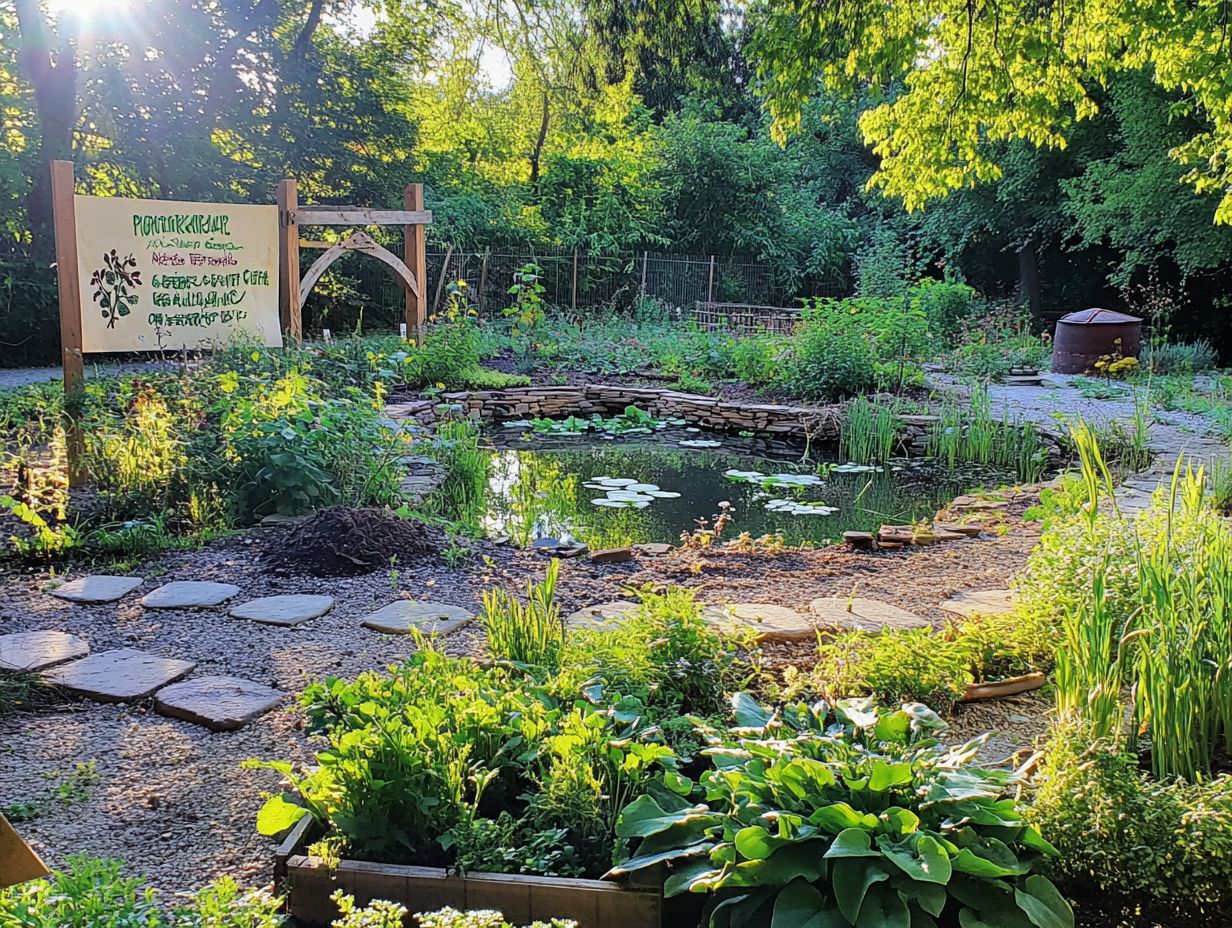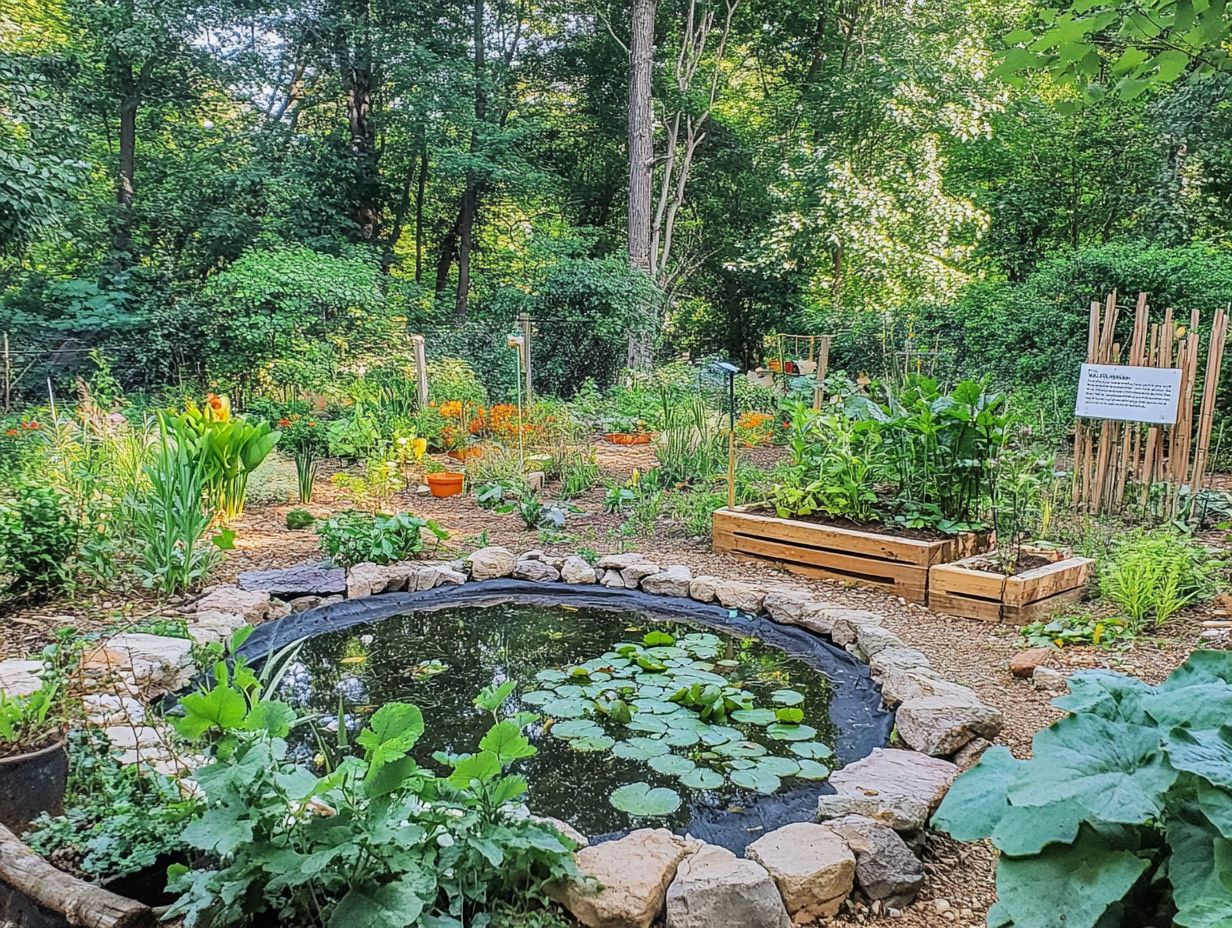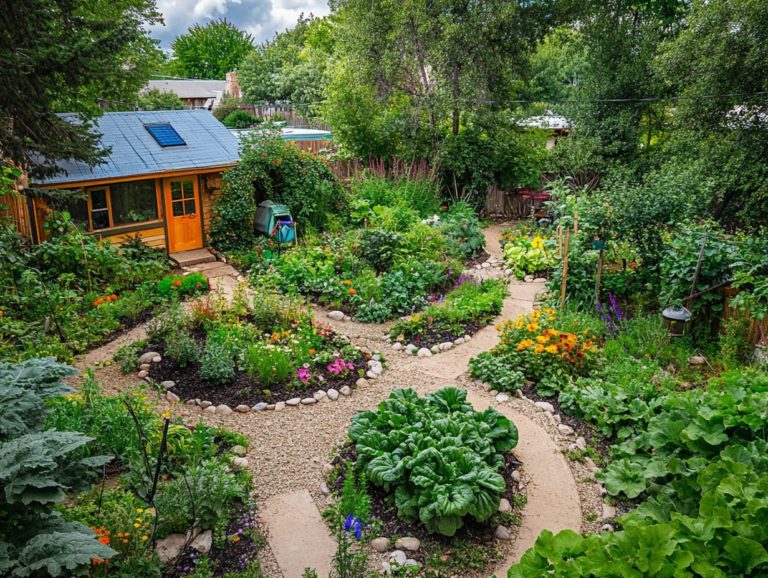What is Permaculture Ethics and Its Framework?
Permaculture transcends the realm of mere sustainable gardening techniques; it embodies a holistic design philosophy that emphasizes a harmonious relationship between people and the planet, reflecting key permaculture principles.
At its foundation lie three guiding ethics: Earth Care, People Care, and Fair Shares, serving as the backbone of permaculture ethics.
This article explores these principles. It offers practical guidance to incorporate these ethics into your daily life.
Whether you are a seasoned gardener, part of a Transition Network, or simply intrigued by sustainable living, you will discover insights that can inspire and elevate your journey.
Contents
- Key Takeaways:
- The Three Ethics of Permaculture
- The Permaculture Design Framework
- Applying Permaculture Ethics in Daily Life
- Frequently Asked Questions
- What is Permaculture Ethics?
- How does Permaculture Ethics differ from traditional ethics?
- What are the three main ethics in Permaculture?
- How does Permaculture Ethics influence design and decision-making?
- What is the Permaculture flower, and what does it represent?
- What are some examples of Permaculture Ethics in action?
Key Takeaways:

- Permaculture is an ethical design approach that prioritizes the well-being of the earth, people, and fair distribution of resources.
- The three ethics of permaculture are Earth Care, People Care, and Fair Shares, serving as a guide for sustainable living and environmental balance.
- The permaculture design framework incorporates key elements and processes to create self-sustaining systems in alignment with the three ethics.
Defining Permaculture and Its Core Principles
Permaculture is an innovative design framework that gives you the power to craft sustainable systems that are environmentally balanced, socially just, and economically viable, promoting a sustainable future. Permaculture is based on Earth Care, People Care, and Fair Shares. It combines ecological design with a focus on restoring the environment and being mindful of how we consume.
By applying these principles, you can significantly reduce your ecological footprint while nurturing biodiversity, food pathways, and resilience within your community. Imagine reducing your ecological footprint while boosting biodiversity in your community! That’s the power of permaculture.
This holistic approach traces its roots back to the 1970s, thanks to trailblazers like Bill Mollison and David Holmgren in places like Eugene, Oregon, who sought to tackle environmental issues by emulating natural ecosystems.
The foundational principles of permaculture support practices like organic farming, agroforestry, and effective water management. These practices are not only relevant in rural settings but also thrive in urban landscapes, where small-scale gardens and green roofs can be part of urban permaculture initiatives.
For example, community gardens in urban areas cultivate food security and foster social cohesion, enhancing community links. Rainwater harvesting systems further enhance urban resilience, proving that every space can contribute to sustainability.
Ultimately, by embracing permaculture s focus on biodiversity, you play a vital role in restoring ecosystems and creating a future where people and nature coexist in perfect harmony, highlighting the importance of ethical principles.
The Three Ethics of Permaculture
The three ethics of permaculture Earth Care, People Care, and Fair Shares serve as your guiding principles in both practice and philosophy, reinforcing the concept of community ethics. They ensure a holistic approach to sustainable living, supporting ethical practices and relational morality.
Together, they foster a deep ethical commitment to environmental stewardship, prioritize social justice, and champion equitable systems designed to benefit both people and the planet, aiming for ecological transformation. Embracing these principles gives you the power to create a more sustainable and just world through active commitment to permaculture ethics.
Earth Care
Earth Care embodies your ethical responsibility to protect and restore the health of our planet’s ecosystems. It ensures environmental balance and nurtures biodiversity for generations to come.
This principle reflects the global ethic of permaculture. It highlights the importance of managing resources responsibly and minimizing your ecological footprint.
In the world of permaculture, Earth Care transcends mere idealism; it forms the very foundation of ecological design and sustainable practices. Using methods like organic farming helps you grow food without harmful chemicals, promoting soil health and reducing pollution.
Engaging in habitat restoration initiatives revitalizes degraded ecosystems, allowing native plants and animals to thrive and exemplifying care work.
Sustainable land management practices, like rotational grazing (rotating livestock between pastures) and agroforestry (integrating trees with crops), enhance biodiversity and optimize resource use. These practices showcase how nurturing the environment can foster natural cycles that support life and contribute to food pathways.
Together, these efforts vividly illustrate the profound impact that a commitment to Earth Care can have on our planet and the well-being of future generations.
People Care

People Care is all about nurturing human relationships and enhancing community well-being. It emphasizes the significance of social justice, equitable systems, and empowering marginalized groups.
This principle invites you to actively engage in care work and youth education, cultivating cultural frameworks that strengthen community ties and foster collaborative networks.
By embracing these values, People Care lays the groundwork for innovative initiatives that promote both individual and community growth. For example, educational programs that teach essential life skills empower youth to advocate for themselves and their communities.
Community gardens provide fresh produce and create spaces for people to connect. They foster a strong sense of belonging and responsibility within the community.
Cooperative housing projects exemplify the essence of People Care by encouraging inclusive living arrangements that support diverse populations. Together, these initiatives enhance resilience and promote equality throughout the community.
Fair Share champions the equitable distribution of resources and opportunities. It ensures you have access to the essentials for a dignified life while minimizing consumption to safeguard the Earth s finite resources.
This principle encourages you to build collaborative networks and sustainable practices that emphasize responsible resource distribution and community resilience.
In practical terms, you ll see this in various permaculture projects that highlight local food systems. These initiatives not only provide you with fresh produce but also foster a sense of community among participants.
Community-supported agriculture (CSA) enables direct relationships between you and farmers, promoting social justice. This approach cuts your reliance on industrial food chains and makes food production clearer.
Engaging in sharing economies, where you exchange goods and services instead of purely purchasing them, illustrates how Fair Share can pave the way for sustainability and social equity.
By prioritizing cooperation and mutual assistance, these initiatives help create a sense of belonging and responsibility while minimizing waste and the overconsumption of resources.
The Permaculture Design Framework
The permaculture design framework offers you a systematic approach to crafting sustainable systems, drawing inspiration from the intricate workings of natural ecosystems and ecological design. By embracing design principles that promote self-reliance and resilience, you empower communities to thrive and build collaborative networks.
This framework encompasses a diverse array of practices, including involving everyone in the design process, which actively engages community members in the creative process and fosters strong community connections.
The result? Solutions that are finely attuned to their specific environments and resource needs, fostering a deeper connection between people and their surroundings, while emphasizing relational approaches.
Key Elements and Processes
Key elements and processes of permaculture design involve grasping ecological relationships, mastering resource management, and nurturing biodiversity. All of these play a vital role in building resilient, sustainable systems and achieving ecological balance.
These components work in harmony to create environments that cater to both human needs and ecological integrity, forming the very foundation of effective permaculture practices focused on cultural sustainability.
Use zoning techniques to strategically position plants and structures based on their usage frequency and energy requirements, optimizing resource management. For example, analyzing the environment to see how sunlight and wind affect your garden can help you identify wind patterns and sun exposure, ensuring that crops are optimally placed for maximum growth.
Water management is equally important. Incorporating swales or rain gardens can efficiently channel runoff while supporting the surrounding ecosystem and promoting biodiversity.
Real-world examples, such as community gardens and resilient farms, showcase these principles in action. They demonstrate how thoughtful design not only boosts productivity but also maintains a harmonious relationship with nature, highlighting the importance of ecological balance.
Applying Permaculture Ethics in Daily Life

Applying permaculture ethics in your daily life means weaving sustainable practices and mindful consumption into your routines, promoting a culture of care ethics. This creates a lifestyle that embodies the principles of Earth Care, People Care, and Fair Shares, encouraging social change and environmental stewardship!
By actively seeking out opportunities to connect with your community and minimize your ecological footprint, you cultivate a culture of sustainability that influences every facet of your existence. Every step counts toward a healthier planet!
Take action now! Implement permaculture principles in your life and inspire others to join you in creating a sustainable future.
Practical Tips and Examples
Practical tips for infusing permaculture ethics into your daily routine include immersing yourself in local food systems and food pathways, engaging in community projects that reflect community ethics, and adopting sustainable practices that resonate with permaculture principles. These actions elevate your personal well-being and fortify the resilience and sustainability of the communities you inhabit.
For instance, consider visiting local farmers’ markets, part of the Transition Network initiative, to support local growers and indulge in fresh, seasonal produce that supports local organic agriculture. If you’re feeling inspired, why not establish a community garden? This initiative fosters collaboration through participatory design and provides a steady source of nutritious food for your family and neighbors.
Discover exciting projects like urban orchards that enhance biodiversity within cities and neighborhood composting initiatives, crucial for resource management. These efforts illustrate how collective initiatives can transform urban spaces into thriving environments that embody permaculture ethics. They promote variety in plants and animals, minimize waste, and create educational opportunities for youth education and mindful consumption. Each step contributes toward a sustainable future that nurtures both people and the planet.
Frequently Asked Questions
What is Permaculture Ethics?
Permaculture Ethics combines ethical principles and relational approaches. It refers to a set of principles that guide sustainable living and design, forming a holistic approach to creating systems that harmonize with nature.
How does Permaculture Ethics differ from traditional ethics?
Permaculture Ethics goes beyond human-centered ethics and considers the well-being of the entire ecosystem. It emphasizes the importance of regenerative practices and waste reduction.
What are the three main ethics in Permaculture?
The three main ethics in Permaculture are Earth Care, People Care, and Fair Share. These principles guide decision-making and aim to create systems that benefit both humans and nature.
How does Permaculture Ethics influence design and decision-making?
Permaculture Ethics provides a framework for designing sustainable systems that mimic nature’s patterns and cycles. It encourages decision-making that considers the long-term effects on the environment and community, fostering equitable systems.
What is the Permaculture flower, and what does it represent?
The Permaculture Ethics flower visually represents the three main ethics and their interconnections. The petals symbolize Earth Care, People Care, and Fair Share, while the center represents the holistic approach of Permaculture.
What are some examples of Permaculture Ethics in action?
Examples include creating a food forest that embodies self-reliance and promotes active commitment to sustainability. Other initiatives, like implementing rainwater harvesting systems and practicing community-based decision-making, reinforce collaborative networks for environmental stewardship.






